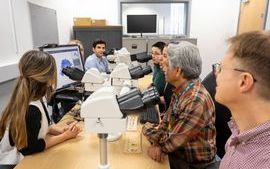- Published:
- 22 April 2025
- Author:
- Taran Kullar
- Read time:
- 5 Mins
Taran Kullar, Junior Clinical Fellow in Microbiology, explores how podcasts can help inform healthcare professionals and students about the importance of antimicrobial stewardship in combating antimicrobial resistance.
I am a Junior Clinical Fellow in microbiology, now based in Cardiff and Vale University Health Board. I have always had a passion for teaching and education; prior to medical school, I worked as a tutor for a local tuition company. I found relaying complex principles in easy-to-understand ways for students at all levels incredibly rewarding and challenging.
I carried on this passion during medical school where I helped provide ward-based teaching and revision sessions to Year 1–3 medical students. For foundation, I was allocated to a Longitudinal Integrated Foundation Training placement in medical microbiology and infectious diseases in Swansea Bay University Health Board. This led to the opportunity to become a co-producer for the Bug’s Life podcast series, alongside specialty trainee colleague Dr Dominic Worku.
Antimicrobial resistance (AMR) is one of the leading issues facing healthcare globally, threatening decades of improvement in infection management. Between 2018 and 2023, the number of AMR infections in England rose by 12.8%.1 The need for new coordinated actions to tackle the issue has never been clearer.
Education has proven effective in antimicrobial stewardship (AMS) by improving the use, selection and duration of antimicrobials. As outlined by a meta-analysis conducted by Lee et al., the number of inappropriate prescriptions for antibiotics made by clinicians fell by an average of 41% in groups who had received teaching around AMS.2 As outlined in the UK 5-year action plans for AMR3 and by the UK Health and Security Agency (UKHSA) in its English surveillance programme for antimicrobial utilisation and resistance (ESPAUR) report,1 education for both healthcare workers and the public on AMS is key in conquering increasing AMR.
Education around AMS has not only proved useful in reducing inappropriate antimicrobial prescribing, but also supports appropriate switching from broader spectrum intravenous agents to more targeted oral antibiotics. McMullan et al. demonstrated that educational interventions aided in increasing intravenous-to-oral switches amongst children within 24 hours from 64% to 82% and reduced hospital stays by a median of 14 hours.4 Education may prove useful at changing other long-standing attitudes about how we manage common infections effectively, improving outcomes while optimising the use and prescription of antimicrobials.
To help challenge the rising rates of AMR locally, the Infectious Diseases and Medical Microbiology department in Swansea Bay University Health Board created an online podcast series. The series started in October 2022 and has been ongoing ever since. The series is designed to provide short educational content on infection-related topics, the goal being to improve local AMS practice as well as better the knowledge and confidence of clinicians and students in managing infection.
In the podcasts, new trends in given infections and common pitfalls in infection management are discussed, providing a comprehensive overview of infection management as well as highlighting the role of public health. To date, over 50 10–15-minute podcasts have been created on key infection subjects and presentations, ranging from fever in the returning traveller to meningitis and Staphylococcus aureus bacteraemia.
This breadth helps to stimulate all members of the multidisciplinary team to appreciate and take an interest in infection management, and we hope to encourage resident doctors to consider microbiology and infection as a career. The podcast is available from several sources, including the Pathology Portal and NHS Learning Hub, or it can also be accessed directly at Bug's Life Podcasts.
Initially, the podcast was advertised locally to healthcare professionals and students within Swansea. With content being regularly released on multiple platforms, the series now has an audience of healthcare workers and students across Wales and beyond. The feedback from clinicians has been overwhelmingly positive. Feedback from local quality improvement projects in both Swansea and Cardiff hospitals demonstrated resident doctors’ interest in these podcasts and increases in self-reported knowledge and confidence in managing several key infections after listening to them. This indicates the importance and success of the podcast and the potential for it, alongside other educational projects, to help in AMS and infection management.
My hope is to continue my passion for providing education to healthcare professionals and students, taking forward key learnings from the various educational projects I've been involved in. My main advice for trainees hoping to get involved in education is to seek out opportunities that may arise within your trust – either through the undergraduate/postgraduate education department or through supervisors in specific specialties.
I was fortunate to have a supportive infectious diseases supervisor in Dr Ian Blyth, who spearheaded the podcast and aided in setting it up – and from there, with the help of the AWARE Wales project, we were able to develop and grow the series to where it is today.
Further action is needed to tackle AMR. Education is an essential tool in this – the Bug’s Life podcast is a great example of how trainees can get involved with creating impactful resources to suit different learning styles.
References available on our website.




